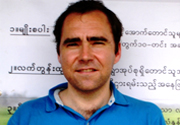| |
|
|

Interviews ::
 |
Amy Wu, an award-winning writer for the women’s Ag and Agtech movement |
 |
Ms. Irene Karani, Children’s Investment Fund Foundations’ Africa Climate Director |
 |
Natalia Schäfer (Schaefer), Leading and Globally Renowned Artist |
|
Read All Interviews |
News / Updates/ Analysis ::
COP 27- some hopes midst of chaos
Climate Change is Happening Now- Time to Take Action!
|


|
|
|

|
DFID is one of the major donors working in Myanmar. DFID along with many other donors and local organizations had played important role to address the problems caused by 2008 Cyclone in Myanmar. Head DFID Burma, Mr. Paul Whittingham shared his thoughts with Prabodh
Devkota and Sabita Gyawali on various aspects of DFID support and the
current situation in Myanmar.
|
- Most often people forget about the long term impacts after the incidences of disasters. What is the latest situation on the victims of 2008 Cyclone in Myanmar? How far the overall reconstruction has been done?
The latest situation is that many affected communities are getting back on their feet, rebuilding their lives and enhancing their resilience to future shocks. However, we know that some often remoter, coastal communities are still at significant risk. The UK Department for International Development (DFID) and other donors are continuing to prioritise assistance to these communities to ensure they are not left behind.
We were also very pleased with the outcome of the joint ASEAN-UN Post-Nargis and Regional Partnership Conference in November last year. The UK committed Ł12 million ($19 million) to the post-Nargis recovery plan at this conference, which mobilized over US$ 88 million in total for urgently needed shelter, fresh water, sanitation, education and health services , and support to get people's livelihoods back on track. So the victims of that terrible tragedy have not been forgotten, though much still remains to be done.
- How did you find the government's commitment to improve human lives midst of cyclone and hunger both in terms of emergency response and longer term response?
The Myanmar Government's response in terms of levels of assistance has been
difficult to gauge. We are yet to see the detail of what has been allocated by the Government to which areas of need among communities affected by Cyclone Nargis.
However, the Tripartite Core Group mechanism has proved a great success in over-seeing and facilitating the humanitarian response to Nargis, and there has been helpful collaboration between the Burmese government, ASEAN and the UN. This cooperation will continue to be crucial to recovery efforts in the Delta.
- As one of the major development partners, how do you see the major climate change related challenges in context of Myanmar?
It is very difficult to obtain reliable data on climate change in this country. We suspect that Burma is a significant emitter of greenhouse gases as a result of deforestation. What is certain is that it will be the poor who are most affected by the impacts of climate change - and we will help them. For example, in response to Nargis, DFID supported disaster risk reduction work, through UNDP and UN Habitat, which helped communities improve their preparedness for future natural disasters. We also funded a group of local NGOs working to restore mangroves in Cyclone-affected areas in the Delta.
Clearly, a lot more could be done to check unsustainable logging and exploitation, but this requires above all genuine commitment by the government to protect not just forests, but the livelihoods and human security of communities living in upland areas. Although, the government has taken a positive step to encourage community forestry, not enough communities have been able to take advantage of the opportunities that exist. We are funding work by independent local NGOs to help communities to protect and re-plant sustainable community forests, and to negotiate the formal process to secure their rights to community forests.
Lifting people out of poverty also has a role in reducing the vulnerability of the poorest to climate change. Through our humanitarian programmes, particularly in improving rural livelihoods, we continue to help communities cope with their changing environment.
- In absence of strong civil society and the dominance of military regime, how much confident you are in ensuring that development initiatives are reaching to the people ?
I think there is a growing recognition that while there are undoubtedly challenges, it is possible to provide aid without in anyway benefiting the regime. The Three Diseases Fund is a good example. Through the UN, NGOs and local community-based organisations, the 3DF is delivering real health benefits to vulnerable populations - such as providing 450,000 people with HIV prevention activities and 800,000 people with bednets. It has shown that with effective monitoring and the right safeguards crucial assistance can reach those of greatest need. This experience provided a powerful model for the Global Fund.
And there are other examples, like the response to Cyclone Nargis by the international community and independent local organisations, which show that good work, can and is being done. The local response provided strong evidence of the existence and potential of civil society organisations, which are independent of government. They were the unsung heroes of Nargis. Without their efforts the suffering in the days immediately after the cyclone would have been very much greater. We are investing in programmes to strengthen the capacity of such independent local organisations.
- What are major funding priorities for DFID in Myanmar for next coming years?
The UK's priority in Myanmar will continue to be to provide humanitarian support in the areas of health, education and livelihoods - especially to the victims of conflict. One specific priority for DFID which I think will be of interest to your readers is a major programme we are funding to improve rural livelihoods and food security in the poorest parts of the country. Given that the majority of the population make their living from farming, increasing food security and agricultural productivity is critical to meeting humanitarian needs here. Proper management of the environment and sustainable use of natural resources are central to this.
- What have been your major learning specially while working in emergency context?
An important lesson has been the importance of supporting communities over time, rather than just in the immediate aftermath of the cyclone. The initial priority was to save lives, then to ensure that poor sanitation, lack of water and heath facilities etc did not cause further loss of life. There was a generous response from the international community in the weeks and months immediately after the Cyclone struck. However, recovery aid money was then slower to arrive. We have been ahead of other donors in making our Ł12 million commitment, and getting it out to those who need it. We actively encouraged other donors to do the same. It is now crucial that pledges made at the Post-Nargis conference in November materialise into real assistance for cyclone survivors as quickly as possible.
For your feedback: secretariat@earthconcernasia.com
Note: Opinions expressed in interview sections and individual write ups are of interviewee/ authors; earth concern facilitates to bring ideas and perspectives.
|
|

